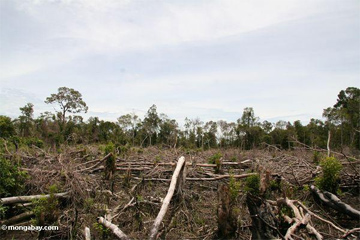Burger King announced it would no longer source palm oil from Sinar Mas, an Indonesian conglomerate, after an independent audit showed one of the company’s subsidiaries had destroyed rainforests and carbon-dense peatlands in Borneo and Sumatra, according to a statement on the fast food chain’s Facebook page.
In a report issued last month, Sinar Mas tried to misrepresent the results of the audit by claiming it cleared its subsidiary PT Smart of environmental transgressions. After the claims appeared in news media, the auditor, BSI Group, rebuked Sinar Mas by releasing a statement emphasizing that PT Smart had cleared forests and peatlands without proper permits in eight out of the 11 concessions audited on Sumatra and Kalimantan, the Indonesian part of Borneo. The activity violated Indonesian law and rules under the Roundtable on Sustainable Palm Oil’s certification system.
Burger King announced its decision in the following statement:
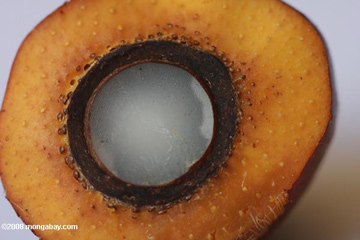
Oil palm fruit |
As part of our BK® Positive Steps corporate responsibility program, Burger King Corp. is committed to sourcing our products from sustainable suppliers. After completing a thorough review of the independent verification report conducted by Control Union Certification (CUC) and BSI Group, we believe the report has raised valid concerns about some of the sustainability practices of Sinar Mas’ palm oil production and its impact on the rainforest. These practices are inconsistent with our corporate responsibility commitments.
As a result, we have decided we will no longer purchase palm oil from Sinar Mas or its subsidiaries. We are in the process of transitioning to a new palm oil supplier for the 176 BURGER KING® restaurants that were supplied by Sinar Mas. In addition, we are notifying our suppliers of our intent to discontinue the use of palm oil supplied by Sinar Mas in the manufacturing of our products.
Burger King’s announcement comes after a campaign by Greenpeace, the activist group whose efforts triggered the original audit of PT Smart’s operations.
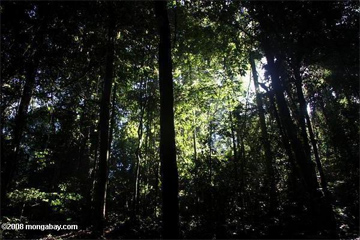
|
Greenpeace is now pressuring Pizza Hut, KFC, and Dunkin’ Donuts to drop Sinar Mas.
Palm oil is used widely in processed foods and cooking oil, but its production has, at times, come at the expense of tropical forests in Indonesia and Malaysia, putting endangered species such as orangutan at risk and increasing greenhouse gas emissions. Greenpeace and other activist groups are trying to persuade the oil palm growers to adopt stronger sustainability standards that would prohibit conversion of forest lands for new plantations.
The palm oil industry maintains its crop is a cheap source of vegetable oil and an important generator of wealth. Producers note that growing less productive sources of vegetable like canola, corn, and soy, would require more land than oil palm.
Related articles
Rapid growth of palm oil industry tramples indigenous peoples’ rights, says report
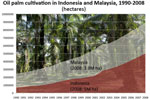
(08/30/2010) Rapid expansion of oil palm plantations across Southeast Asia have run roughshod over customary tenure systems, resulting in exploitation of local communities, conflict, and outright human rights abuses, reports a new assessment of the palm oil sector by the Forest Peoples Programme (FPP), an international indigenous rights group.
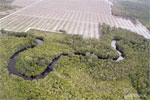
(08/19/2010) Sinar Mas, an Indonesian conglomerate whose holdings include Asia Pulp and Paper, a paper products brand, and PT Smart, a palm oil producer, was sharply rebuked Wednesday over a recent report where it claimed not to have engaged in destruction of forests and peatlands. At least one of its companies, Golden Agri Resources, may now face an investigation for deliberately misleading shareholders in its corporate filings.
